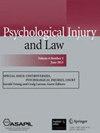The Inventory of Problems–29 is a Cross-Culturally Valid Symptom Validity Test: Initial Validation in a Turkish Community Sample
IF 2.7
Q2 PSYCHOLOGY, CLINICAL
引用次数: 0
Abstract
Abstract Because the actuarial evidence base for symptom validity tests (SVTs) is developed in a specific population, it is unclear whether their clinical utility is transferable to a population with different demographic characteristics. To address this, we report here the validation study of a recently developed free-standing SVT, the Inventory of Problems-29 (IOP-29), in a Turkish community sample. We employed a mixed design with a simulation paradigm: The Turkish IOP–29 was presented to the same participants ( N = 125; 53.6% female; age range: 19–53) three times in an online format, with instructions to respond honestly (HON), randomly (RND), and attempt to feign a psychiatric disorder (SIM) based on different vignettes. In the SIM condition, participants were presented with one of three scripts instructing them to feign either schizophrenia (SIM-SCZ), depression (SIM-DEP), or posttraumatic stress disorder (SIM-PTSD). As predicted, the Turkish IOP–29 is effective in discriminating between credible and noncredible presentations and equally sensitive to feigning of different psychiatric disorders: The standard cutoff (FDS ≥ .50) is uniformly sensitive (90.2% to 92.9%) and yields a specificity of 88%. Random responding produces FDS scores more similar to those of noncredible presentations, and the random responding score (RRS) has incremental validity in distinguishing random responding from feigned and honest responding. Our findings reveal that the classification accuracy of the IOP–29 is stable across administration languages, feigned clinical constructs, and geographic regions. Validation of the Turkish IOP–29 will be a valuable addition to the limited availability of SVTs in Turkish. We discuss limitations and future directions.问题清单- 29是一个跨文化有效的症状效度测试:在土耳其社区样本的初步验证
由于症状效度测试(SVTs)的精算证据基础是在特定人群中开发的,因此尚不清楚其临床效用是否可转移到具有不同人口统计学特征的人群中。为了解决这个问题,我们在这里报告了最近开发的独立SVT的验证研究,问题清单-29 (iop29),在土耳其社区样本中。我们采用混合设计和模拟范式:将土耳其的io - 29提供给相同的参与者(N = 125;53.6%的女性;年龄范围:19-53岁),在网上进行三次测试,并根据不同的小场景进行诚实回答(HON)、随机回答(RND)和尝试假装精神障碍(SIM)。在模拟精神分裂症(SIM- scz)、抑郁(SIM- dep)或创伤后应激障碍(SIM- ptsd)这三种剧本中,研究人员向参与者展示其中一种。正如预测的那样,土耳其的iop29在区分可信和不可信的表现方面是有效的,并且对不同精神疾病的假装同样敏感:标准临界值(FDS≥0.50)是一致敏感的(90.2%至92.9%),并产生88%的特异性。随机反应产生的FDS分数与非可信陈述的FDS分数更接近,随机反应分数(RRS)在区分随机反应与虚假反应和诚实反应方面具有递增的效度。我们的研究结果表明,在不同的管理语言、虚构的临床结构和地理区域中,io - 29的分类准确性是稳定的。土耳其的io - 29的验证将是对土耳其有限的svt可用性的有价值的补充。我们讨论了局限性和未来的方向。
本文章由计算机程序翻译,如有差异,请以英文原文为准。
求助全文
约1分钟内获得全文
求助全文
来源期刊

Psychological Injury & Law
PSYCHOLOGY, CLINICAL-
CiteScore
5.70
自引率
25.80%
发文量
29
期刊介绍:
Psychological Injury and Law is a journal designed as a multidisciplinary forum for the dissemination of research articles and scholarly exchanges about issues pertaining to the interface of psychology and law in the area of trauma, injury, and their psychological impact. The journal intends to help build the evidentiary research base of the field, and to critically examine its concepts and practice. Psychological impairments and disabilities may arise from physical and/or mental injuries ascribed to alleged negligent actions. They need to be judiciously assessed for their validity, and treated when evaluated as valid. They lead to legal and related action when there are long term or permanent effects.
 求助内容:
求助内容: 应助结果提醒方式:
应助结果提醒方式:


